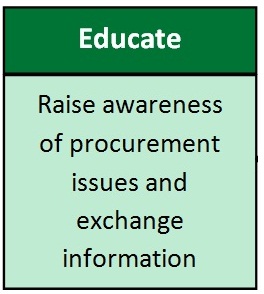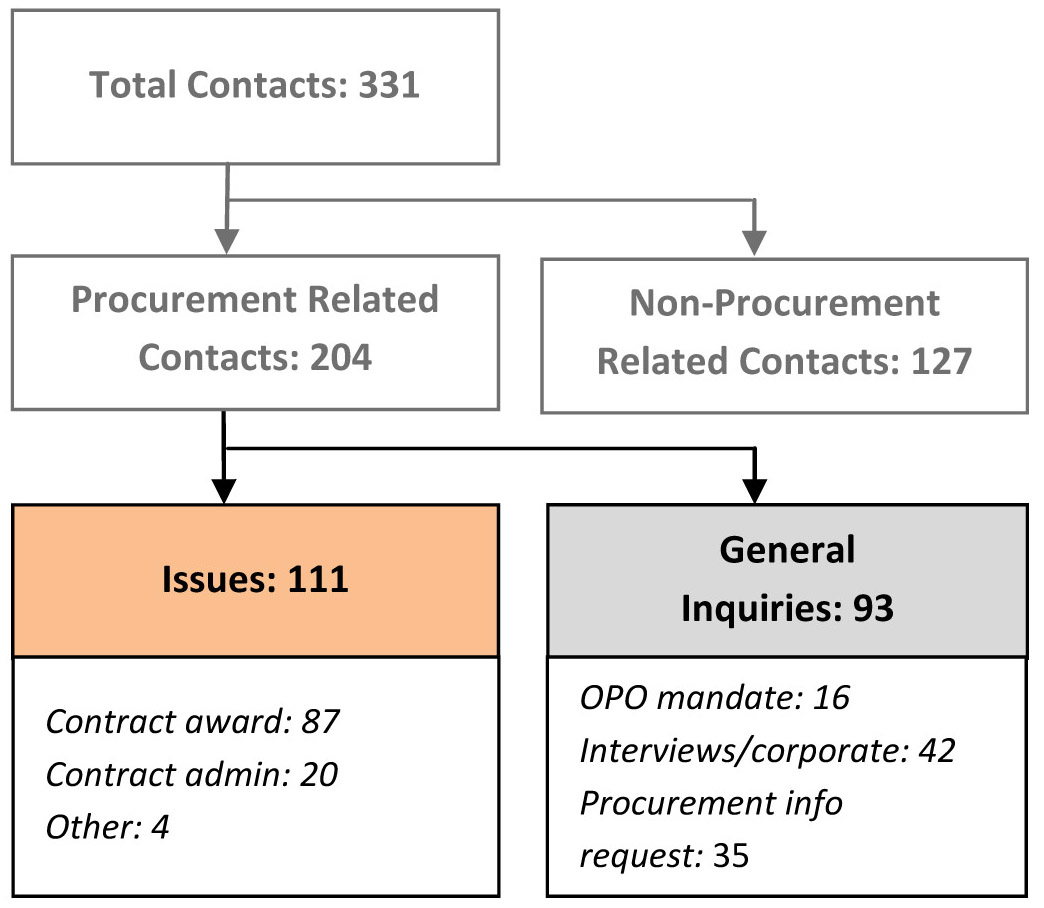Educate
Two-Way Street

The Office approaches its Educate strategic objective as a two-way street. On the one hand the 204 contacts provide OPO with a valuable source of procurement-related information, which allows monitoring of issues and trends; on the other hand, it enables OPO to share and exchange information that often de-escalates issues that are brought to the Office's attention.
Of the 204 procurement-related contacts the Office in 2011-12, 111 (54%) were categorized as issues and 93 (46%) as general inquiries.

The most common procurement-related issuesbrought to OPO's attention by suppliers in 2011-12 did not significantly differ from the previous year, with five of the six issues remaining unchanged. The one exception is the addition of "Inaction by department," which replaced "Payment" among the top issues. The issues being reported to the Office in the "Inaction by department" category include not providing adequate responses to suppliers' questions and not debriefing unsuccessful bidders following the award of contracts.
| Top Procurement-Related Issues | 2011-12Footnote 1 | 2010-11 |
|---|---|---|
| Evaluation and Selection Plan (e.g. restrictive criteria or biased ratings) |
32 | 29 |
| Procurement Strategy (e.g. too often non-competitive) |
27 | 19 |
| Statement of Work or Specification (e.g. unclear or unbiased) |
24 | 13 |
| Evaluation of Bids (e.g. unfair evaluation process) |
22 | 33 |
| Contract Execution (e.g. altering the contract) |
14 | 16 |
| Inaction by Department (e.g. not responding or providing debriefings) |
9 | n/a |
| Payment (e.g. late payments) |
n/a | 10 |
In addition, OPO has heard concerns from suppliers regarding standing offers and supply arrangements, tools used by the government for the repetitive purchase of common goods and services. These concerns include the view of suppliers that it is cumbersome and difficult to prepare bid documents and qualify under these tools, the impact not qualifying has on their business as they may not have access to government business for an extended period, and the perception that the processes to establish these tools are not always transparent. We have also heard from government officials who express confusion over which of the various standing offers or supply arrangements should be used for services (given some of the tools appear to be similar) and concerns regarding suppliers changing items and/or prices on standing offers when contracts are issued. The Procurement Ombudsman Regulations prevent the Office from investigating specific complaints on standing offers and supply arrangements as these are not contracts, but rather an umbrella agreement that may result in contracts for qualifying suppliers. Nonetheless, the Office brings these types of concerns to the attention of key senior federal officials and, where reasonable grounds can be established, launches practice reviews.
The remaining 93 (46%) procurement-related contacts with the Office were general inquiries, which include requests for information on OPO's mandate, seeking information on the federal procurement process, and copies of reports and other procurement-related information. Responding to inquiries can be as simple as providing information over the telephone. It may also involve pointing stakeholders to effective practices or recommendations for improving fairness, openness and/or transparency in reports published by the Office. Whether it is addressing issues or responding to inquiries, OPO strives to share information brought to its attention with federal departments to try and help resolve issues.
For example, OPO received a complaint regarding a Request for Proposal (RFP) where the competition had been limited to companies located in the National Capital Region. The contract in question was subject to the Agreement on Internal Trade, which is meant, among other things, to reduce barriers to trade within Canada. The Office brought this discrepancy to the attention of the contracting department. In response, the department terminated the resulting contract, explaining to the Office that it had not been aware of the requirement to open the competition to suppliers in all provinces and territories in instances where contracts are subject to the Agreement on Internal Trade.
OPO's efforts to share information are not limited to the Canadian context. In the fall of 2011, the Office was invited to meet with officials of the Russian government to discuss Russia's efforts to transform its federal procurement system. OPO was able to provide information on procurement training and methods of resolving contract disputes outside the court system. The Office was informed about legislation being established in Russia that will require federal departments to publish three-year forecasts of projected procurements. OPO's efforts to remain aware of effective procurement practices in other jurisdictions, in conjunction with stimulating positive dialogue and the exchange of ideas, are an important component in promoting continuous improvement in the federal procurement process.
The Office strives to raise awareness of procurement issues through information exchange. Often, exchanging information helps address complaints made to this office. In other cases, the provision of information is not enough, and we are called upon to help facilitate issues raised by stakeholders.
Footnotes
- Footnote 1
-
Top related issues for 2011-12 total 128, which differs from the 111 issues-related contacts. This discrepancy is due to multiple procurement issues being identified through single contacts.
- Date modified: